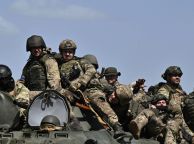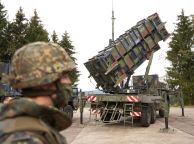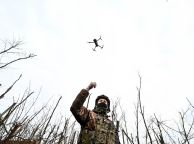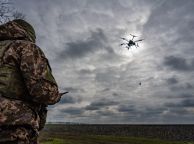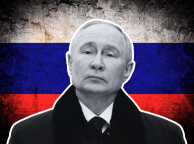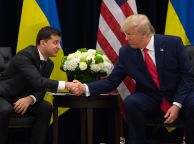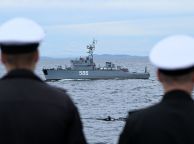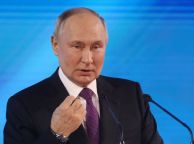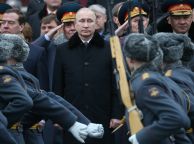By David Brennan
Ukraine's "Sea Baby" naval drones appear to have a new weapon in their ongoing effort to cow the Russian Black Sea Fleet, per a new video purportedly showing unmanned vessels firing a salvo of unknown munitions towards one of Moscow's warships.
Ukrainska Pravda first posted the video, which it said showed one of the Security Service of Ukraine's (SBU) drones firing what appeared to be unguided munitions at Russian ships that emerged from a Crimean port during an operation.
Previous images and videos of Sea Baby drones suggested the craft were armed with weapons beyond their main explosive payload. However, this week's video was the first evidence of such capability.
Newsweek could not independently verify the footage and has contacted the Russian Defense Ministry by email to request comment.
Andriy Ryzhenko, a retired Ukrainian naval captain and now a strategic expert at the defense and logistics consultant company Sonata, told Newsweek that a version of the RPV-16 thermobaric rocket launcher is "most probably" the new weapon system.
The weapon can fire thermobaric munitions with a "much greater impact" than conventional high explosives, Ryzhenko said. The range of the system is around 1,000 yards.
Though low-tech, such armaments could complicate Russian efforts to intercept and neutralize Ukrainian drones in the Black Sea, Ryzhenko believes.
"Certainly, this drone can do at least some kind of self-defense, or damage a vessel on its way to an attack," he said. "For example, if this drone attacks a Russian ship and the Russian ship conducted anti-drone defense, they can activate the launchers—there can be six on one drone—and damage the ship or neutralize its defense capabilities."
"It's very limited, it's only one grenade launcher. But anyway, it's good that they have this system...They can bring a certain value when breaking through an enemy defense when the drone is approaching the target."
Ukrainian drones have posed serious problems for Russia's Black Sea Fleet, which, despite Kyiv's lack of a conventional navy, has not been able to establish total control of the key strategic sea. Naval drones have repeatedly attacked Russian warships, port infrastructure, and the Kerch Strait Bridge.
Ukraine's "drone tsar," Vice President Mykhailo Fedorov, told Newsweek in August that Kyiv's growing unmanned littoral fleet "serves for conducting special operations, and for sure it has its role in the liberation of the temporarily occupied Black Sea coastal area."
Vasyl Maliuk, the head of the SBU, told Ukrainska Pravda this week that the service is "striving to knock out all missile carriers" in the Black Sea. The next targets will be Russian submarines, Maliuk said. "There should be no Russian fleet in Crimea at all."
Maliuk added that the presence of naval drones has forced Russian vessels into port, allowing Kyiv's grain corridors—a response to Russia's intermittent naval blockade of southern Ukrainian export ports—to function.
Ryzhenko said future Ukrainian drones may be even deadlier. "In future, they can design a drone—maybe like a catamaran—armed with anti-ship missiles like the NSM [Naval Strike Missile]," he said. "An NSM weighs only 410kg [903lbs], and even the Sea Baby can carry 850kg."
A catamaran-style drone may increase stability in the choppy seas, Ryzhenko added, enabling greater accuracy and lethality. "If we can put one or two missiles on a catamaran or any other kind of drone, and ensure deployment of this system closer to Russian ports, it will be really great."
"To provide targeting it's quite easy, actually, we don't need to have satellite communication for the missiles, we just need to see the target and push the button," he said. "It's possible to do it, it's not complicated. This is what I see as the potential for the development of the unmanned vessels."

